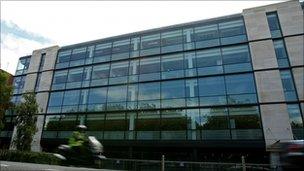Developer Paddy McKillen challenges 'bad bank'
- Published

Mr McKillen is challenging the treatment of his loans from Bank of Ireland
The High Court in Dublin will hear a challenge to the operation of the Irish Republic's "bad bank", the National Asset Management Agency, in the autumn.
The National Asset Management Agency (Nama) was set up to take all property and development loans of more than 5m euros off the books of the Irish banks.
It was set up in response to the property crash which has crippled Irish banks.
Under the scheme Bank of Ireland intends to transfer to Nama 80m euros in loans it made to the Belfast-born developer Paddy McKillen.
Mr McKillen is resisting the move saying it would have "a drastic and detrimental impact on his business and property rights."
He is arguing that even though Nama is taking both good and bad loans it has become associated with troubled developers.
He said his Bank of Ireland loans were "fully performing" - meaning he is repaying on the terms originally agreed with the bank.
Mr McKillen apear to have come through the property crash in better shape than many Irish developers - he has significant assets in the recovering London property market and also invested in Asia.
His London investments include a large stake in Maybourne hotel group - the company which owns the five-star Claridge's, Connaught and Berkeley hotels.
He co-owns a number of Northern Ireland registered property firms including Belfast Office Properties and Finbrook Investments.
On Monday Mr McKillen's barrister, Michael Cush, told the court he did not see the proceedings as a full frontal attack on Nama.
He said the action was in part related to procedures and definitions but it was hugely important to Mr McKillen.
However, Nama's barrister Brian Murray said the challenge "poses a very real threat to the vital work of the agency".
Mr Murray added that part of the challenge alleged that the definition of eligible assets used in the act was unconstitutional.
He said if that part of the act was struck down, it would have very significant implications for Nama's operations.
In a document sworn in on behalf of Nama, the court was told that if there was a perception that the system under which Nama operated was flawed, that would undermine building of confidence in the international markets, which the ongoing work of Nama seeks to foster.
Mr Justice Kelly said he was satisfied the case was one of very considerable urgency.
- Published28 June 2010